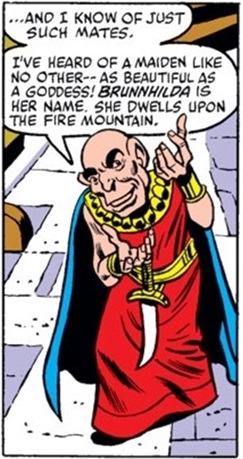 HAGEN
HAGEN
 HAGEN
HAGEN
Real Name: Hagen
Identity/Class: Unrevealed (Uncertain connection to Asgardian cosmology; see comments)
Occupation: Unrevealed (see comments)
Group Membership: Nibelung clan
Affiliations: Alberich;
formerly Gunther, Gutruna, and the Gibichung clan (although he was aiding them toward his own ends);;
feigned alliance and manipulated Siegfried (a mortal incarnation of Thor Odinson)
Enemies: Brunnhilde the Valkyrie (in her Brunnhilda incarnation), Gunther, Siegfried, Odin (indirectly)
Known Relatives: Alberich (father), Grimhilde (mother, see comments)
Mime (paternal uncle, deceased);
Gunther (maternal half-brother), Gutruna (maternal half-sister);
Siegfried (not an actual
relationship, but was the godson or possibly adoptive son of Hagen's
uncle Mime, which would make them semi-not-really cousins)
Aliases: None
Base of Operations: Unrevealed;
formerly the Gibichung clan's stronghold;
formerly Nibelheim (terrestrial subterranean caverns)
First Appearance: Waltharius (circa 1000 AD, possibly earlier);
(Wagner's Hagen) Götterdämmerung
(The German word for Ragnarok, or The Twilight of the Gods), the final part in the opera "Der
Ring des Nibelungen" (The Ring of the Nibelung) opera (August 17, 1876);
(Marvel's Hagen) Thor I#299 (September, 1980)

Powers/Abilities: Hagen was dwarven in stature.
He somehow acquired a potion that could make a man forget those he has loved and enslave him to the first woman he beheld.
He is sufficiently skilled with a spear to shove it through the mid-section of even a superhumanly powerful warrior such as Siegfried.
He carried and could throw a dagger with deadly accuracy at close range (several feet away)
Height: Approximately 3'
Weight: Approximately 100 lbs. (assuming human body density, see comments)
Eyes: Brown
Hair: Bald (black eyebrows)
History:
(Thor
I#299 (fb) -
BTS)
- Hagen was the son of the Nibelung clan dwarf Alberich via the mother
of the Gunther and Gutruna, the former of whom would become the leader
of the Gibichung clan leader, Gunther (see comments). "An ill wind had long blown between" Hagen and Gunther, and Gunther considered Hagen to be treacherous.
(Thor
I#299 (fb)
- BTS)
- Hagen acquired a potion that
could make a man forget those he has loved and enslave him to the first
woman he beheld.
(Thor
I#299 (fb)-
BTS)
- Hagen learned of the existence and current fates of Siegfried,
Brunnhilda, and the Ring of Power / Ring of Nibelung, previously held
by Alberich.
(Thor
I#299 (fb)-
BTS)
- Hagen either sensed the approach of Siegfried to or arranged for (via
unspecified methods) the castle stronghold of the Gibichung clan.
(Thor
I#299 (fb))
- Appearing in
the courtyard of the Gibichung castle, Hagen knelt before Gunther and
asked him to give audience to his humble words. When Gunther begrudging
approved while denouncing Hagen as treacherous, Hagen claimed to be
wronged and to only be seeking to make amends for their past problems.
Further claiming to be desiring the best for the Gibichung, which was
also the clan of his mother, Hagen told Gunther and Gutruna that he had
realized that the fame of the Gibichungs could spread no further until
they both had found mates worthy of their station.
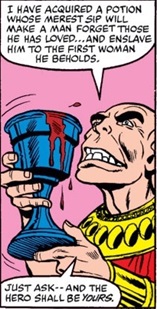
He then told them of the beautiful Brunnhilda and the great hero Siegfried, noting the potion he had that could enslave Siegfried, and that he had arranged for Siegfried's arrival.
(Thor I#299 (fb) - BTS) - Seeking adventures and a repast, Siegfried stopped at Gunther's castle. Though guards barred his trespass verbally and physically, Siegfried easily overwhelmed the lot of them.
(Thor I#299 (fb)) - Hagen appeared, telling him the guards had only been instructed to test him to prove him to be the true Siegfried, of whose heroism "the very Rhine sang."
Hagen then brought Siegfried before Gunther, who apologized for the testing and, as recompense, offered Siegfried anything in his kingdom. When Siegfried noted that he craved only adventure, Gunther arranged a toast to Siegfried's exploits before seeking to devise another, leading Siegfried to drink Hagen's potion-tainted wine. Siegfried swiftly forgot Brunnhilda as soon as he tasted the wine, after which he gazed upon and fell passionately in love with Gutruna.
At Siegfried's questioning, Gutruna
admitted that she was available, but that it would be unseemingly for
her to marry before her brother did. Gunther, following Hagen's
guidance, arranged for Siegfried to bring Brunnhilda to him in exchange
for marrying Gutruna; Gunther agreed and the two swore a
blood oath. Hagen then advised Siegfried to use the Tarnhelm to alter
his appearance to take Gunther's form.
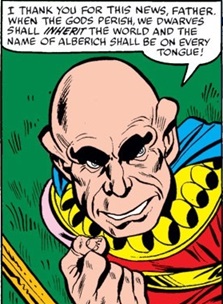
After Siegfried departed, Hagen plotted to trick Gunther into slaying Siegfried, enabling Hagen to claim the Ring of the Nibelung, which he would use to rule all gods and men.
(Thor I#299 (fb)) - While Siegried captured
Brunnhilda, Hagen was awakened from his slumber by a dream-like form of
his father, Alberich, who bade him good tidings and noted
that Hagen's plan to avenge Alberich's disgrace was going well. He
continued that Hagen's machinations looked to thwart Odin's plan to
have Siegfried purge the Ring of Power of its curse.
Hagen thanked his father, noting that when the gods
perished, the dwarves would inherit the world, and the name of Alberich
would be on every tongue.
(Thor I#299 (fb)) - At the next dawn, Hagen greeted Siegfried (still in Gunther's form) as he returned to the Gibichung castle, after which he delivered the still unconscious Brunnhilda to Gunther and then transformed back to his own appearance at Gunther's request. The dual wedding of Gunther to Brunnhilda and of Siegfried to Gutruna was thus planned. Pleased with; Brunnhilda's beauty and with how Siegfried was smitten with Gutruna, Gunther assured Hagen he would be richly rewarded for his counsel. Hagen acknowledged this politely, though he felt he would gain far more than what Gunther expected.
That evening, the dual wedding commenced. However, as Brunnhilde regained her wits, she expressed her confusion as she insisted Siegfried was her lover. Although Siegfried denied this (as he had no memory of her), Hagen advised Gunther that Siegfried possessed the ring Brunnhilda had held, indicating that it was a symbol of her maidenhood. Reasoning incorrectly that Siegfried had had his way with Brunnhilda while disguised as Gunther the previous night, Gunther ordered his guards to slay Siegfried.
As Siegfried proceeded to route all of his opponents, a tearful Brunnhilda -- distraught by Siegfried's apparent betrayal -- unwittingly admitted that he was indeed charmed, impervious to all harm provided he never turned his back on his foe; Hagen overheard this revelation.
Realizing he was risking losing all of his men, Gunther halted his forces, and allowed Siegfried to depart forever with Gutruna.
As Siegfried departed, Hagen assured Gunther he could make Brunnhilda his with a sip of his potion, and that he now knew how to kill Siegfried.
(Thor I#300 (fb) - BTS) - Gunther decided to make amends with Siegfried for his sister's sake, and he told Hagen he no longer wanted to kill Siegfried.
Hagen and Gunther went hunting, capturing a fowl of some sort.
(Thor
I#300 (fb))
- Hagen and Gunther approached Siegfried, and -- after Gunther noted that he had come to make
amends, as it was unseemly to be an enemy to his sister's future
husband and that had come to accept that Siegfried had done nothing
to break his oath to him -- Hagen's invited him
to dine with them on the bird they had caught.
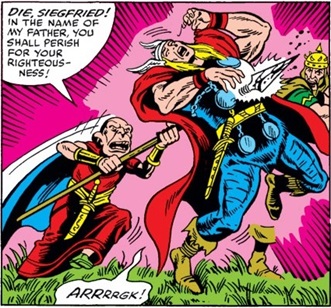
Giving Siegfried some ale to quench his frustrated thirst, Hagen nonetheless considered that while Gunther had gone back on their plan to to slay Siegfried, he had not, as he must regain his father's Rhinegold ring.
As Siegfried was distracted in conversation with Gunther, Hagen -- recalling Sieglinda unwittingly revealing Brunnhilde's vulnerability to attacks from behind -- rushed forward and shoved his spear through Siegfried's back.
Siegfried turned, snapping the spear's shaft and accepting that the ring was indeed cursed before lunging at Hagen, but he died and collapsed before reaching Hagen.
Gunther chastised Hagen, asking if it was not enough that they had
tricked Siegfried into giving up his true love, Brunnhilda, to him. Promising Siegfried a Viking's funeral, Gunther then lifted
Siegfried's body atop his steed and led him back to the castle, where
he told Gutruna that Hagen was his killer. However, as Gunther drew his
sword, planning to slay Hagen for his crimes, Hagen swiftly pulled his dagger and hurled it into Gunther's
chest, killing him.
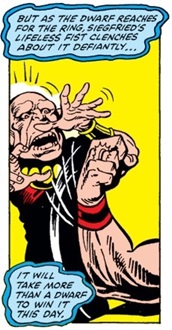
Gutruna then ordered the guards to seize Hagen, and Hagen attempted to claim the Rhinegold ring, bragging that he would soon have all others in his power, but Siegfried's lifeless fist suddenly clenched the ring defiantly, preventing Hagen from getting it.
As Hagen was taken away by the guards, Brunnhilda entered and learned of her lover's death.
(Thor I#300 (fb)) - Brunnhilda had a great funeral pyre burnt for Siegfried, after which she and her steed leapt into the fire as well. Brunnhilda and Siegfried were taken to Asgard, where Odin reincarnated Brunnhilde and Thor in their godly forms.
Comments: Created by unidentified Norse persons in the Nibelungenlied (more on that below);
adapted by Richard Wagner in his Ring of the Nibelung trilogy (more on that below);
adapted to Marvel from Wagner's version by Roy Thomas, Keith Pollard, and Chic Stone.
For this and all profiles related to the Ring of the Nibelung, you
should open up another page in your browser and load Wagner's "Ride
of the Valkyrie"
Something like this (if/when this link becomes
defective, just search for it)
Yes, this is Elmer Fudd's "Kill the Wabbit" song...
What are the Nibelung?
These stories were among those told to Thor by the Eye of Odin, and the events therein, particularly the origins of the current Odin incarnation, have been called into question.
Courtesy of Wikipedia.
Götterdämmerung (German for the Twilight of the Gods), is the last in Richard Wagner's cycle of four music dramas titled Der Ring des Nibelungen (The Ring of the Nibelung, or The Ring for short). It received its premiere at the Bayreuth Festspielhaus on 17 August 1876, as part of the first complete performance of the Ring.
The title is a translation into German of the Old Norse phrase Ragnarök, which in Norse mythology refers to a prophesied war among various beings and gods that ultimately results in the burning, immersion in water, and renewal of the world. However, as with the rest of the Ring, Wagner's account diverges significantly from his Old Norse sources.
The Ring of the Nibelung comes, in a very general way, from the old Norse/Germanic legend of the Nibelungenlied ("The Song of the Dwarves"). Hagen is apparently based on the dwarf Hogni from that story.
Hagen (German form) or Högni (Old Norse Hǫgni, often anglicized as Hogni) is a Burgundian warrior in tales about the Burgundian kingdom at Worms. Hagen is often identified as a brother or half-brother of King Gunther (Old Norse Gunnarr). In the Nibelungenlied he is nicknamed "from Tronje".
All attempts to interpret Hagen's name or home are highly speculative. Although the Nibelungenlied has a historic center, it was written down only centuries later, in 1200, and therefore incorporated the author's Medieval knowledge and intentions. There are suggestions that the epithet refers to more or less similar-sounding place names. However, names that have only a phonetic similarity but no meaningful link with the legend are rejected by scholars, since it is very likely that such connections are random and add nothing to the interpretation of the character. It is believed that the poet of the Nibelungenlied accepted Tronje as a real place name in the Burgundian kingdom; but it is questionable that he himself knew its exact location, since the story's many geographical mistakes suggest that his knowledge of the area around Worms was not particularly good.
Nevertheless, a link to Hagen has been discussed regarding the following places:
In the Nibelungenlied, he is called Hagen of Tronje.
Some versions indicate he is the 'Oheim' of the three kings, i.e. their mother Ute's brother (or brother-in-law, following an now outdated German dual model of indicating and differing between matrilineal and patrilineal kinship). Some count him as Gunter's, Gernot's and Giselher's 'uncle' (originally a father's brother or brother in law, as opposed to 'Oheim'), so this may more likely hint to an old custom - nearly, but not yet completely outdated - where people close to a family take over the role of a fatherly / motherly friend and acquire the 'honorary title' of an uncle or aunt (see the German expression 'Nennonkel/-tante' - 'termed uncle / -aunt'). In German tradition, Hagen is especially grim, implacable, and violent and in two accounts one-eyed.
According to the Thidreks saga, Hagen was Gunnar's (senior?) half-brother. Not fully human, though, as being fathered by an elf on the king's wife while the king was away. The Thidrekssaga also tells that it was Walter of Waskensten (Walter of Aquitaine) who put out Hagen's eye in a fight.
In these forementioned accounts, it is Hagen who kills the hero Siegfried during a hunt, wounding him on the only part of his body which was not invulnerable. This version of the character appears in Wagner's Der Ring des Nibelungen. In Norse tradition, Hagen's counterpart Högni is less extreme and the actual slayer of Sigurd (the Norse counterpart to Siegfried) is Gutthorm, a younger brother of Gunnar and Högni. But Gutthorm does so when egged on by his elder brothers.
In German accounts, Gunther and Hagen are the final casualties of the fall of the Nibelungs. Hagen refuses to reveal the hiding place of the Nibelung treasure to Kriemhild as long as his king Gunther lives. When Gunther is slain, the mortally-wounded Hagen continues his refusal with sure knowledge that Gunther cannot now weaken and betray the secret.
In Norse accounts, however, it is Gunnar who refuses to tell the secret to Attila the Hun as long as Högni lives, and so brings about Högni's death, as his heart is cut out.
In Atlamál, Hniflung a son of Hagen/Högni avenges his father's death and the deaths of his kin together with his aunt Guðrún. This work also states that Hogni had a wife named Kostbera and two other sons: Solar and Snævar. The Drap Niflunga mentions a fourth son named Gjuki (named after Hogni's father).
In the opera Götterdämmerung, part of The Ring Cycle, Hagen is portrayed as the half-brother of Gunther and Gutrune, illegitimately fathered by the dwarf Alberich (and
so by extension Siegfried's step-cousin). He is similarly depicted as
evil and cunning, acting under the influence of his father but for his
own interests.
The act begins in the Hall of the Gibichungs, a population dwelling by the Rhine. Gunther, lord of the Gibichungs, sits enthroned. His half-brother and chief minister, Hagen, advises him to find a wife for himself and a husband for their sister Gutrune. He suggests Brünnhilde for Gunther's wife, and Siegfried for Gutrune's husband. He reminds Gutrune that he has given her a potion that she can use to make Siegfried forget Brünnhilde and fall in love with Gutrune; under its influence, Siegfried will win Brünnhilde for Gunther. Gunther and Gutrune agree enthusiastically with this plan.
Siegfried appears at Gibichung Hall, seeking to meet Gunther. Gunther extends his hospitality to the hero, and Gutrune offers him the love potion. Unaware of the deception, Siegfried toasts Brünnhilde and their love. Drinking the potion, he loses his memory of Brünnhilde and falls in love with Gutrune instead. In his drugged state, Siegfried offers to win a wife for Gunther, who tells him about Brünnhilde and the magic fire which only a fearless person can cross. They swear blood-brotherhood (Hagen holds the drinking horn in which they mix their blood, but he does not join in the oath) and leave for Brünnhilde's rock. Hagen, left on guard duty, gloats that his so-called masters are unwittingly bringing the ring to him.
Meanwhile, Brünnhilde is visited by her Valkyrie sister Waltraute, who tells her that Wotan returned from his wanderings with his spear shattered. Wotan is dismayed at losing his spear, as it has all the treaties and bargains he has made—everything that gives him power—carved into its shaft. Wotan ordered branches of the World tree, to be piled around Valhalla; sent his magic ravens to spy on the world and bring him news; and currently waits in Valhalla for the end. Waltraute begs Brünnhilde to return the ring to the Rhinemaidens, since the ring's curse is now affecting their father, Wotan. However, Brünnhilde refuses to relinquish Siegfried's token of love, and Waltraute rides away in despair.
Siegfried arrives, disguised as Gunther by using the Tarnhelm, and claims Brünnhilde as his wife. Though Brünnhilde resists violently, Siegfried overpowers her, snatching the ring from her hand and placing it on his own.
Act 2
Hagen, waiting by the bank of the Rhine, is visited in his semi-waking sleep (sitting up, eyes open, but motionless) by his father, Alberich. On Alberich's urging, he swears to kill Siegfried and acquire the ring. Alberich exits as dawn breaks. Siegfried arrives via Tarnhelm-magic, having resumed his natural form and left Brünnhilde on the boat with Gunther. Hagen summons the Gibichung vassals to welcome Gunther and his bride. He does this by sounding the war-alarm. The vassals are surprised to learn that the occasion is not battle, but their master's wedding and party.
Gunther leads in a downcast Brünnhilde, who is astonished to see Siegfried. Noticing the ring on Siegfried's hand, she realizes she has been betrayed—that the man who conquered her was not Gunther, but Siegfried in disguise. She denounces Siegfried in front of Gunther's vassals and accuses Siegfried of having seduced her himself. Siegfried, who does not remember ever having been Brünhilde's lover, swears on Hagen's spear that her accusations are false. Brünnhilde seizes the tip of the spear and swears that they are true. Once again Hagen supervises silently as others take oaths to his advantage. But this time, since the oath is sworn on a weapon, the understanding is that if the oath is proven false, the weapon's owner should avenge it by killing the perjurer with that weapon. Siegfried then leads Gutrune and the bystanders off to the wedding feast, leaving Brünnhilde, Hagen, and Gunther alone by the shore. Deeply shamed by Brünnhilde's outburst, Gunther agrees to Hagen's suggestion that Siegfried must be killed in order for Gunther to regain his standing. Brünnhilde, seeking revenge for Siegfried's manifest treachery, joins the plot and tells Hagen that Siegfried would be vulnerable to a stab in the back. Hagen and Gunther decide to lure Siegfried on a hunting-trip and murder him. They sing a trio in which Brünnhilde and Gunther vow in the name of Wotan, "guardian of oaths", to kill Siegfried, while Hagen repeats his pledge to Alberich: to acquire the ring and rule the world through its power.
Act 3
In the woods by the bank of the Rhine, the Rhinemaidens mourn the lost
Rhine gold. Siegfried happens by, separated from the hunting party. The
Rhinemaidens urge him to return the ring and avoid its curse, but he
laughs at them and says he prefers to die rather than bargain for his
life. They swim away, predicting that Siegfried will die and that his
heir, a lady, will treat them more fairly.
Siegfried rejoins the hunters, who include Gunther and Hagen. While resting, he tells them about the adventures of his youth. Hagen gives him another potion, which restores his memory, and he tells of discovering the sleeping Brünnhilde and awakening her with a kiss. Hagen stabs him in the back with his spear. The others look on in horror, and Hagen explains in three words ("Meineid rächt' ich!" – "I have avenged perjury!") that since Siegfried admitted loving Brünnhilde, the oath he swore on Hagen's spear was obviously false, therefore it was Hagen's duty to kill him with it. Hagen calmly walks away into the wood. Siegfried recollects his awakening of Brünnhilde and dies. His body is carried away in a solemn funeral procession.
Back in the Gibichung Hall, Gutrune awaits Siegfried's return. Hagen arrives ahead of the funeral party. Gutrune is devastated when Siegfried's corpse is brought in. Gunther blames Siegfried's death on Hagen, who replies that Siegfried had incurred the penalty of his false oath, and further, claims the ring on Siegfried's finger by right of conquest. When Gunther objects, Hagen appeals to the vassals to support his claim. Gunther draws his sword but Hagen attacks and easily kills him. However, as Hagen moves to take the ring, Siegfried's hand rises threateningly. Hagen recoils in fear.
Brünnhilde makes her entrance and issues orders for a huge funeral pyre to be assembled by the river. She takes the ring and tells the Rhinemaidens to claim it from her ashes, once fire has cleansed it of its curse. Lighting the pyre with a firebrand, she sends Wotan's ravens home with "anxiously longed-for tidings", and to fly by the magic fire for Loge to fulfill his task. After an apostrophe to the dead hero, Brünnhilde mounts her horse Grane and rides into the flames.
The fire flares up, and the hall of the Gibichungs catches fire and collapses. The Rhine overflows its banks, quenching the fire, and the Rhinemaidens swim in to claim the ring. Hagen tries to stop them but they drag him into the depths and drown him. As they celebrate the return of the ring and its gold to the river, a red glow is seen in the sky. As the Gibichungs watch, the interior of Valhalla is finally seen, with gods and heroes visible as described by Waltraute in Act 1. Flames flare up in the Hall of the Gods, hiding it and them from sight completely. The gods are consumed in the flames.
The most notable difference (as pertains to Hagen) between the stories in Thor and Wagner's Ring Cycle (Götterdämmerung specifically) is that in Wagner's tale, Brünnhilde takes the ring and returns it to the Rhinemaidens, and Hagen is drowned in the river trying to reclaim it.
Hagen's (and Gunther's) mother was not identified in the Thor stories, but she was named Grimhilde in Wagner's Götterdämmerung; it is further noted that Alberich paid for Grimhilde's love with gold.
New images by Ron Fredricks.
Profile by Snood.
CLARIFICATIONS:
Hagen should be distinguished from:
images: (without ads)
Thor I#299, p3, pan2 (full);
Thor I#299, p10, pan3 (headshot - Hagen, startled)
Thor I#299, p3, pan5 (Hagen, with love potion)
Thor I#299, p10, pan7 (Hagen, vowing to Alberich)
Thor I#300, p3, pan5 (Hagen stabs Siegfried)
Thor I#300, p4, pan8 (Hagen tries to take Ring from Siegfried's corpse, but corpse defiantly clenches Ring)
Appearances:
Thor I#299 (September, 1980) - Mark Gruenwald (writer), Keith Pollard (penciler), Chic Stone (inker), Jim Salicrup (editor)
Thor I#300 (October, 1980) - Mark Gruenwald & Ralph Macchio (writers), Keith Pollard (penciler), Chic Stone (inker), Jim Salicrup (editor)
First posted: 11/12/2018
Last updated: 04/17/2024
Any Additions/Corrections? please let me know.
Non-Marvel Copyright info
All other characters mentioned or pictured are ™ and
© 1941-2099 Marvel Characters, Inc. All Rights Reserved. If you
like this stuff, you should check out the real thing!
Please visit The Marvel Official Site at: http://www.marvel.com
Special Thanks to www.g-mart.com for hosting the Appendix, Master List, etc.!